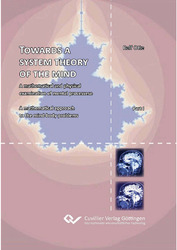| Areas | |
|---|---|
| Serie de libros (97) |
1383
|
| Nachhaltigkeit |
3
|
| Gesundheitswesen |
1
|
| Letra |
2379
|
| Ciencias Naturales |
5409
|
| Matemática | 228 |
| Informática | 320 |
| Física | 980 |
| Química | 1365 |
| Geociencias | 131 |
| Medicina humana | 243 |
| Estomatología | 10 |
| Veterinaria | 108 |
| Farmacia | 147 |
| Biología | 835 |
| Bioquímica, biología molecular, tecnología genética | 121 |
| Biofísica | 25 |
| Nutrición | 45 |
| Agricultura | 1005 |
| Silvicultura | 201 |
| Horticultura | 20 |
| Ecología y conservación de la tierra | 148 |
| Ciencias Ingeniería |
1799
|
| General |
97
|
|
Leitlinien Unfallchirurgie
5. Auflage bestellen |
|
Erweiterte Suche
Towards a system theory of the mind (Tienda española)
A mathematical and physical examination of mental processese A mathematical approach to the mind-body problems
Ralf Otte (Autor)Previo
Indice, Datei (38 KB)
Lectura de prueba, Datei (74 KB)
A system theory of the mind? It sounds like cybernetics, chaos theory, autopoiesis, or the theory of mind (TOM). This monograph, however, aims to break new ground. Leafing through this book, one notices formulae and unusual characters which seem to join forces and walk across the pages like centipedes. This book is more than challenging for readers who do not come into contact with mathematics regularly. And this is how the author believes he can explain what nobody has thus far been able to explain – how can the mind be understood and how can its state variables be calculated? He draws on quantum physics, a field that is oft en not understood even by its own practitioners. How can such a book expect to reach readers and how can the views included here expect to find adherents? Even scientists who devote themselves to research on the mind are likely to eschew the imaginary and complex numbers, Fourier transformations and quaternions presented here in favour of more established and conventional approaches. Once one has started reading, it soon becomes apparent that it might not be wise – or even possible – to ignore the ideas presented here for long. Prof. Dr. Gerald Wolf (from the foreword) A very interesting book. Explaining mental processes with mathematic formulae seems to be adventurous. However, it is a promising approach! Prof. Dr. Pauen, Humboldt-University Berlin
| ISBN-10 (Impresion) | 3954040638 |
| ISBN-13 (Impresion) | 9783954040636 |
| ISBN-13 (E-Book) | 9783736940635 |
| Formato | A5 |
| Idioma | Inglés |
| Numero de paginas | 92 |
| Laminacion de la cubierta | Brillante |
| Edicion | 1 |
| Volumen | 0 |
| Lugar de publicacion | Göttingen |
| Fecha de publicacion | 17.04.2012 |
| Clasificacion simple | Libro de divulgacion |
| Area |
Biofísica
|
| Palabras claves | Geist-Körper-Problem, Mathematische Modellierung des Bewusstseins, Komplexe Zahlen zur Modellierung, psychologischer Vorgänge, Hyperkomplexe Algebren zur Modellierung psychologischer Vorgänge, Systemtheorie für das Gehirn, Chaosprozesse bei der menschlichen Wahrnehmung, Beschreibung der Binokularen Rivalität, Brain-to-Computer Interface |








